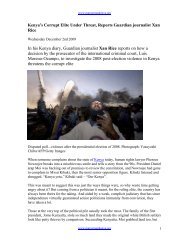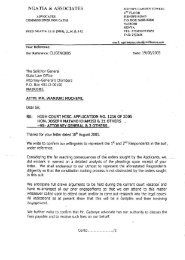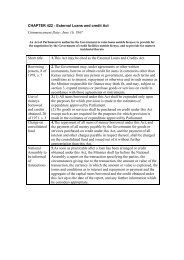why ambassador bethuel kiplagat should quit for kenya to attain ...
why ambassador bethuel kiplagat should quit for kenya to attain ...
why ambassador bethuel kiplagat should quit for kenya to attain ...
Create successful ePaper yourself
Turn your PDF publications into a flip-book with our unique Google optimized e-Paper software.
www.marsgroup<strong>kenya</strong>.org<br />
S. Abdi Sheikh<br />
On 11 January 1985, the Principal State Counsel, M. Ole Keiwua, wrote on behalf<br />
of the At<strong>to</strong>rney General <strong>to</strong> Ibrahim Khamis Adan and Alinoor Yussuf Mohamed<br />
Hussein through their lawyers, Munikah and Company Advocates, asking them,<br />
in accordance with the rules of civil procedures, <strong>to</strong> supply specific in<strong>for</strong>mation<br />
about the death of their fathers. The in<strong>for</strong>mation requested included the particular<br />
dates and times when the deceased persons were killed; whether they were killed<br />
by the Kenya Army Personnel, the Kenya Police or 1982 Air<strong>for</strong>ce personnel; and<br />
the names of the specific officers responsible <strong>for</strong> the deaths of the deceased.<br />
Khamis Adan Mumin, Ibrahim’s father, worked <strong>for</strong> Wajir County Council until<br />
his death; Yussuf Mohamed Hussein was a civil servant in the Ministry of Health.<br />
The two were among 55 or so employees of various government agencies who<br />
disappeared from work in early February 1984, never <strong>to</strong> be seen again. Their<br />
employers reported them as having deserted their duties and their families could<br />
not access their terminal benefits.<br />
The question of who killed these two men and more than three thousand others<br />
was raised in parliament by the <strong>for</strong>mer Member of Parliament <strong>for</strong> Wajir West, the<br />
late Ahmed Khalif Mohamed, on 21 March 1984. During a debate on then-<br />
President Moi’s speech at the opening of that parliamentary session, Khalif<br />
accused the security <strong>for</strong>ces of killing hundreds in Wajir District. The government<br />
<strong>for</strong>ces, he said, had placed more than 4000 people in a concentration camp, over<br />
300 had been immediately executed, and over 600 were confirmed missing.<br />
Khalif directly accused the PC <strong>for</strong> North Eastern Province, Benson Kaaria, and<br />
the Somalia government of collusion in the murder. Kaaria had claimed, as<br />
reported by the Standard on November 9, 1980, that he would eliminate all<br />
Somali-speaking people in the country unless they exposed shifta who had killed<br />
a District Officer. Khalif’s accusations were met with utmost hostility by the<br />
entire parliament. Mwai Kibaki, Keneth Matiba, A. Y. Boru and Samuel Ng’eny<br />
demanded substantiation. Charles Muthura accused Khalif of irrelevance in his<br />
contribution <strong>to</strong> the presidential speech while Parmenas Munyasia jestingly<br />
demanded <strong>to</strong> know the names of those who threatened <strong>to</strong> wipe out the Somalis.<br />
Khalif was cornered in<strong>to</strong> dropping the Somalia claim but s<strong>to</strong>od his ground on the<br />
mass killings of Somalis in Wajir. In a bid <strong>to</strong> substantiate his claim the late MP<br />
tabled the lists of massacre victims and their pho<strong>to</strong>graphs in parliament on 28<br />
March 1984; many on the list were civil servants, including Noor Haji, the <strong>for</strong>mer<br />
Sena<strong>to</strong>r from Wajir, who had been killed in the military operation.<br />
The question of just what happened at Wagalla Airstrip between 10 and 14<br />
February 1984 was partially answered by the late Justus Ole Tipis in a ministerial<br />
statement about the military operation, read on the floor of parliament on the night<br />
of 12 April 1984, and reported in the Nation of April 13 1985. Ole Tipis revealed<br />
that the security situation in Wajir was politically motivated, and that leaders were<br />
involved in divisive strategies planned along ethnic considerations. He claimed<br />
that the government decided <strong>to</strong> carry out its operations against the Degodia<br />
www.marsgroup<strong>kenya</strong>.org 9







